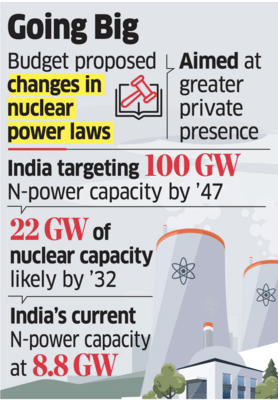India is considering qualifying criteria for private companies looking to operate nuclear power plants, said people familiar with deliberations.
Such companies are barred from nuclear power generation, which is at present limited to central public sector undertakings.
Deliberations are ongoing to frame or change laws to allow their participation.
The companies are likely to be evaluated by the government or a designated agency across several parameters, including financial and technical strengths, experience and track record, the people said. A minimum threshold of sustained positive revenue for a specific timeframe is among parameters being discussed to qualify for a licence. Potential applicants may also need to have a certain level of experience in setting up large projects.

Legalities Being Discussed
These conditions would be part of rules that would be rolled out after completion of the legislative process, people said.
“The idea is to allow companies that are established and have a proven record of developing large projects,” said one of the persons cited. “The company should be a going concern, with a good financial outlook.” To have an active partnership with the private sector, the budget had proposed amendments to the Atomic Energy Act and the Civil Liability for Nuclear Damage Act.
Both Acts were introduced in the context of a state-owned nuclear thrust. The idea now is to encourage private sector participation as the clean energy requirement is set to rise in line with India’s Viksit Bharat 2047 vision. Hectic deliberations are on to firm up changes to the two Acts, including legal vetting, said the person cited above.
The liability law, envisaged as a safeguard against fallout after any nuclear accident, has been a long-standing concern of potential investors.
India has currently installed nuclear power capacity of around 8.8 GW from 23 operational plants owned and run entirely by Nuclear Power Corporation of India. The government has set a target for 100 GW of nuclear energy capacity by 2047. It is aiming to first reach 22 GW nuclear power capacity by 2032.
Such companies are barred from nuclear power generation, which is at present limited to central public sector undertakings.
Deliberations are ongoing to frame or change laws to allow their participation.
The companies are likely to be evaluated by the government or a designated agency across several parameters, including financial and technical strengths, experience and track record, the people said. A minimum threshold of sustained positive revenue for a specific timeframe is among parameters being discussed to qualify for a licence. Potential applicants may also need to have a certain level of experience in setting up large projects.
Legalities Being Discussed
These conditions would be part of rules that would be rolled out after completion of the legislative process, people said.
“The idea is to allow companies that are established and have a proven record of developing large projects,” said one of the persons cited. “The company should be a going concern, with a good financial outlook.” To have an active partnership with the private sector, the budget had proposed amendments to the Atomic Energy Act and the Civil Liability for Nuclear Damage Act.
Both Acts were introduced in the context of a state-owned nuclear thrust. The idea now is to encourage private sector participation as the clean energy requirement is set to rise in line with India’s Viksit Bharat 2047 vision. Hectic deliberations are on to firm up changes to the two Acts, including legal vetting, said the person cited above.
The liability law, envisaged as a safeguard against fallout after any nuclear accident, has been a long-standing concern of potential investors.
India has currently installed nuclear power capacity of around 8.8 GW from 23 operational plants owned and run entirely by Nuclear Power Corporation of India. The government has set a target for 100 GW of nuclear energy capacity by 2047. It is aiming to first reach 22 GW nuclear power capacity by 2032.
You may also like

Chloe Ayling reveals damaging toll of people not believing her terrifying kidnap plot

Over 3,000 Boeing fighter jet workers went on strike; here's why

The two common breakfast items that raise cholesterol - and it's not eggs

FICCI FLO Chennai Celebrates Young Icons Who 'Scale Heights & Sow Hope'

Kavitha begins 72-hour fast in Hyderabad for 42 pc BC reservation






